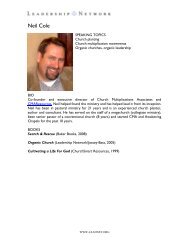ARE WE A PEOPLE AT HALF TIME? - Leadership Network
ARE WE A PEOPLE AT HALF TIME? - Leadership Network
ARE WE A PEOPLE AT HALF TIME? - Leadership Network
Create successful ePaper yourself
Turn your PDF publications into a flip-book with our unique Google optimized e-Paper software.
The days of the “Lone Ranger”<br />
leader are numbered. After all,<br />
even the Lone Ranger had Tonto.<br />
The shift from a single leader to a<br />
leadership team is perhaps one of<br />
the most difficult, yet necessary,<br />
transitions for church leaders to<br />
make in order to be effective in<br />
the 21st Century. The story of<br />
Brentwood Presbyterian Church’s<br />
journey to becoming a teambased<br />
congregation has many lessons<br />
for church leaders. Leading<br />
the Team-Based Church, a new<br />
book by senior pastor George<br />
Cladis, provides valuable insight<br />
into the characteristics and<br />
biblical foundations of creating a<br />
church culture that fosters and<br />
celebrates team. We thank the<br />
staff of Brentwood for sharing<br />
their story and Jossey-Bass<br />
Publishers for the use of excerpts<br />
from Leading the Team-<br />
Based Church.<br />
2 Gifts from the Top<br />
Down<br />
A PROFILE OF<br />
TEAM LEADERSHIP<br />
5 Leading the<br />
Team-Based Church<br />
by GEORGE CLADIS<br />
7 LN Recommends<br />
8 Large Church<br />
NETWORKS<br />
9 Young Leader<br />
NETWORKS<br />
10 Church Champions<br />
NETWORK<br />
11 <strong>Leadership</strong><br />
Training <strong>Network</strong><br />
V O L U M E 5 , N U M B E R 2 A P R I L • M A Y • J U N E , 1 9 9 9<br />
One of the characteristics of effective<br />
churches in today’s culture is their philosophy<br />
and practice of team-based ministries<br />
and the impact this has on their approach to<br />
staffing and leadership development. The<br />
specifics of structure and operationalizing this<br />
approach vary according to the needs and<br />
culture of each church.<br />
Effective churches have at least the following<br />
three key aspects in common.<br />
<strong>Leadership</strong> is decentralized and<br />
becomes a gift-based partnership<br />
between pastor, staff and lay persons.<br />
F R O M L E A D E R S H I P N E T W O R K<br />
Effective Churches and Team <strong>Leadership</strong><br />
One of the important lessons<br />
learned from decades and<br />
even centuries of hierarchical<br />
leadership is that it<br />
tends to immobilize people.<br />
Structure takes precedence<br />
over mission and<br />
highly centralized leadership<br />
blocks the contribution of the gifts and talents<br />
of people throughout organizations. Even<br />
churches. Perhaps especially churches.<br />
Making this transition in leadership does not<br />
come naturally to a congregation. It requires<br />
both intentionality and “spade work.” There<br />
must be a conscious decision on the part of<br />
the existing leaders to give their leadership<br />
away and to literally push the ministry of the<br />
church out the door and into the community.<br />
It results in the mutual empowerment of people<br />
in ministry but it also requires the hard<br />
work of cultivating the soil of the congregation’s<br />
culture to accept the changes.<br />
Diffusing leadership throughout the congregation<br />
through ministry teams often means that<br />
the role of the staff changes. Rather than serving<br />
as doers of ministry, they become equippers<br />
of others in ministry and facilitators of<br />
ministry teams. Many staff members find it<br />
more difficult to adjust to this role shift than<br />
the lay persons on their team because the staff<br />
has been trained in a model of ministry that<br />
emphasizes the “doing of ministry themselves”<br />
rather than the “leadership of ministry<br />
done by others.”<br />
The leader’s abilities flow from an<br />
authentic relationship with God.<br />
This seems obvious, right One<br />
cannot be an effective leader in<br />
ministry without an authentic<br />
relationship with God. Yet in<br />
our professionally credentialed,<br />
achievement-oriented<br />
culture, it is possible to confuse<br />
skills and competency with the inner<br />
qualities of character, trust and integrity.<br />
Unless leaders are connected to God in a<br />
growing relationship sustained by spiritual<br />
disciplines and accountability, their leadership<br />
will ultimately prove hollow. Effective leaders<br />
give attention to and nurture the inner side of<br />
leadership.<br />
The role of the pastor is determined<br />
by their calling, gifts, needs of the<br />
church, and the gifts of others on the<br />
leadership team.<br />
The leadership expectations<br />
placed on pastors today are<br />
often excessive. They are<br />
expected to be all things to all<br />
people. A shepherd. A teacher.<br />
A CEO. A counselor. A spiritual<br />
director. A vision-caster. A<br />
preacher. And the list goes on and on. There<br />
is little consideration for the calling and gifting<br />
that is unique to each person or the particular<br />
leadership needs of the specific<br />
congregation. Effective churches are recognizing<br />
that pastoral roles are best determined by<br />
the calling and gifts of the leader in the context<br />
of the entire leadership team and the<br />
leadership needs of the congregation at that<br />
time. For one pastor it might mean a teaching<br />
role. For another, preaching or spiritual leadership<br />
might be emphasized. With this<br />
approach to ministry, all of the leadership<br />
needs of the congregation are met through<br />
the collective gifts and callings of the entire<br />
team rather than the single leader. ■<br />
www.leadnet.org







